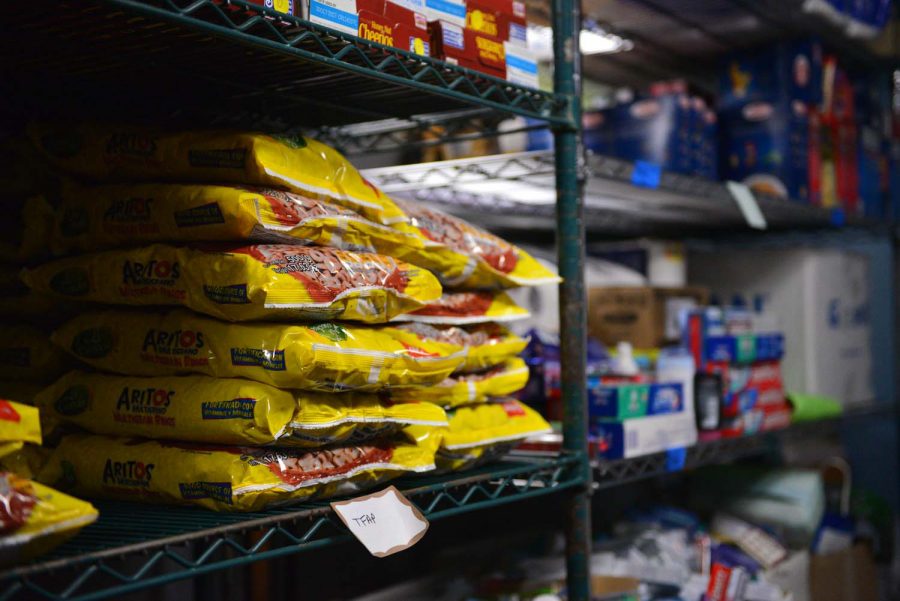Pitt Pantry continues to aid students, community despite closure
The Pitt Pantry continues to assist students during the COVID-19 pandemic after temporarily closing its space in Bellefield Presbyterian Church.
April 15, 2020
EDITOR’S NOTE: With campuses emptied and University life brought to a halt, student journalism is in a tough spot right now. We’re asking our readers to please support the work of our current staff, as well as the next generation of Pitt student journalists, by donating here. Thank you for your support!
The Pitt Pantry has closed its space in Bellefield Presbyterian Church for an indefinite amount of time in order to follow social distancing guidelines in the wake of the COVID-19 pandemic.
But despite the temporary closure, the pantry continues to assist students through meal passes that can be used at Quick Zone in Litchfield Towers. Any Pitt student, faculty or staff member in need of food can request 10 passes every seven days through an online form.
According to Ciara Stehley, the pantry’s coordinator and a sustainability program assistant for PittServes, more than 100 University affiliates have applied for meal passes.
“The swipes quickly emerged as the best option at the time because they could be loaded remotely and accessed at the convenience of the recipients,” Stehley said.
The Pantry has adjusted its services and hours multiple times due to the rapidly changing nature of the pandemic.
When the University moved classes online in March, the Pantry began to operate on limited hours. Walk-in hours were previously Tuesday from 2 to 7 p.m., with appointments available Monday, Thursday and Friday from 9 a.m. to 5 p.m. University spokesperson Kevin Zwick said the staff enforced social distancing guidelines and increased sanitation efforts when the space was still open.
The pantry then switched to prepackaged bag delivery on March 20. The items were transported through a noncontact dropoff in Towers lobby, Zwick said, where people were given an assigned pickup time for their delivery.
This transition helped the problem of the limited pantry staff, Stehley said, which relies on the help of student volunteers, and best adhered to safety guidelines.
Pelumi Olugbenga, a first-year student in the Graduate School of Public and International Affairs, said he received groceries from the Pitt Pantry through the noncontact dropoff in Towers lobby.
This was the first time he utilized the pantry, he said, and chose to do so after going to the grocery store and not being able to find some of the things he needed.
Olugbenga said the delivery was labeled with his 2P Panther Card number. He said his delivery included canned goods, paper products and more, and that the process went smoothly.
“I think it was pretty swift,” Olugbenga said. “I think they did a very good job, considering the situation at hand.”
Olugbenga said he hasn’t been able to return to his home in Nigeria since the pandemic and has been staying at his residence in North Oakland. He decided not to apply for the meal passes because he wanted to limit his physical contact with others, he said. He’s been ordering food on Grubhub and trying to ration what food he has.
The pantry prepared and delivered grocery bags for Olugbenga and 23 others by March 23.
Stehley said as the situation evolved, package delivery became more difficult. Some recipients were unable to come to Towers at their designated pickup time due to personal scheduling conflicts.
“As University buildings were closed to uphold social distancing guidelines, it became impossible to efficiently and effectively pack and transport the bags,” Stehley said.
The pantry announced the meal swipe distribution plan on March 23. It remains unclear when the pantry will reopen.
“We are closely monitoring the situation in order to make that determination,” Zwick said.
Besides the meal swipe program, Stehley encouraged students to pursue other food resources in the Pittsburgh area, such as the Community Human Services pantry on Lawn Street in South Oakland. Once it closed, Pitt Pantry donated the rest of its food supply to CHS, Stehley said. In addition to its Oakland location, CHS has other locations in the Strip District and Downtown.
In the event a member of the Pitt community is in need of assistance, but finds themselves with symptoms of COVID-19, Stehley said they can email [email protected] to receive help. Other options include community-based providers who can provide a noncontact delivery or who allow a healthy “proxy” to pick up orders for someone feeling unwell. But according to a Facebook update from April 10, CHS will no longer allow proxy pickups, and encouraged someone in this situation to call the CHS phone number.
Despite the changing circumstances, Stehley said the Pitt Pantry is doing its best to serve the University in times of need.
“We have always been and will continue to be available to the entire Pitt Community,” Stehley said.



